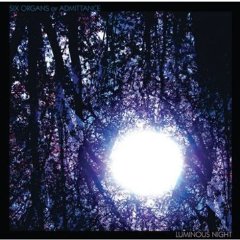The last record put out by Six Organs of Admittance, Shelter From the Ash, was an ominous, powerful, sprawling LP which took hold of the listener following repeated listens. It buffed up Ben Chasny’s noise-folk style — too much for some people’s liking. Pitchfork, in particular, smelt a rat: ‘Here, Six Organs is doing for psychedelic folk what Jackson Browne and the Eagles did for pop-reared folk-rock,’ wrote Grayson Currin, ‘hybridizing polished, perfected takes on touchstones into a safe-for-anyone alloy.’
If that was polished, then eleventh album Luminous Night is a widescreen epic complete with surround sound. Inspired by Kurosawa soundtacks, it has an expansive cinematic feel, as Ben Chasny carries on the project started with the last album.
On Shelter, Chasny’s weary tones were perfectly offset by his partner Elisa Ambrogio of Magik Markers; this combination was one of the album’s highlights. Yet, aside for a credit on the artwork, Ambrogio is absent here. While their partnership worked well, breaking away has helped give this record focus; there were times during the last that they seemed lost in a confusing expanse — indeed that was part of the appeal. Here, though, there is a balance between highs and lows that plots a more extreme and satisfying trajectory.
The most optimistic track, ‘Cover Your Wounds With The Sky’ — a freeform, minimalist dirge based around the noise a four-track cassette makes after it had been buried in sodden earth in Seattle — is followed by ‘Ursa Minor’, a song that spins 180 degrees toward sheer desperation. ‘We took a train last week,’ Chasny intones, ‘but the trains don’t run no more’. The situation becomes terminal as the song progresses: people are dying, there is only a month’s worth of food left; he ‘thought about tomorrow and locked the door’.
The song evokes Cormac McCarthy’s too-close-for comfort prediction of a desolate future, The Road. The ash motif in the last album follows this same logic, as do the videos that accompanied ‘Goodnight’ and the eponymous track from Shelter from the Ash which could have been made to accompany the book.
If Chasny is a follower of ‘Cormac McCarthyism’ — as Oprah Winfrey put it — it is the stillness of form, the divinity in simplicity, that connects them. McCarthy famously eschews punctuation aside from the full stop and colon, preferring to let the words do the work. You could see the Six Organs method to making music in a similar way: methodical, studious, but never cold or cynical. It is an approach born out of humanity, a fascination with the big questions. One sentence in The Road, referred to by Oprah, sums up McCarthy’s style best: ‘If he is not the word of God God never spoke.’ That line could easily be slotted into most of the songs on Luminous Night.
There is, of course, some fantastic guitar-work at the heart of this album but, intriguingly, is it’s no longer the focal point. Chasny recently hinted a move away from guitar, to avoid the inevitable ego-masturbation that comes with concentrating on one’s axe. It means his creations can grow, become whole.
The flutes of Hans Teuber and tabla played by Tor Dietrichson contemplate Eastern promise on ‘Bar Nasha’, and it’s in that direction that Chasny often ventures for inspiration. The album’s title is borrowed from the Kuwaiti spiritual scholar A.H. Almaas’s autobiographical study of Being, Luminous Night’s Journey. In the same way, Chasny used the title of Henry Corbin’s meditation on the sacred in Islam for the title of the opening track on the previous
LP, ‘Alone With the Alone’. He is a seeker by nature, searching for answers, clues to the human condition.
That Chasny is always studying in this way is what makes Six Organs tick. It has resulted in his most clear-eyed, metaphysical exploration yet, as well as — thanks also to wonder-producer Randall Dunn — some of the best noise released this year. This is music for our age: playful yet serious, and not afraid of exploring Big Ideas, or presenting grim outcomes, in a way people can understand.


